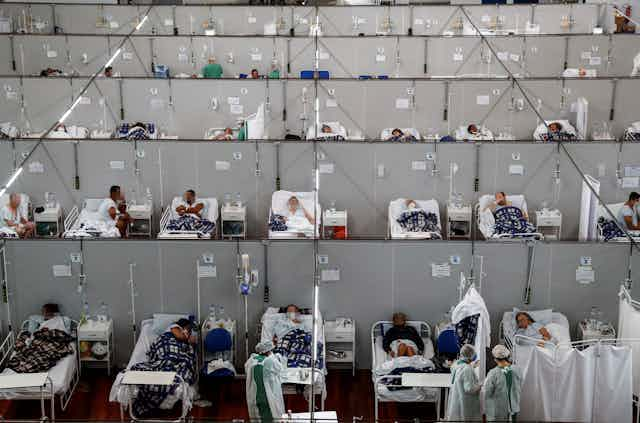Brazil has had what is arguably the worst pandemic policy response in the world, driven by its far-right president, Jair Bolsonaro. The president’s choices in handling COVID-19 have triggered an unparalleled tragedy in the country, with potentially catastrophic implications worldwide.
Matters have deteriorated considerably since the emergence of a new and more contagious variant in the country, known as P1. The death toll in Brazil has been rising relentlessly, reaching 4,250 on April 8 – the highest number of daily fatalities from the disease on Earth.
The health system has collapsed in numerous cities. There, oxygen supplies are rationed, ICU beds are fully occupied, and both staff and equipment are lacking.
There are reports of patients being tied up in order to be intubated, for want of anaesthetics. Hundreds have died on trolleys, hospital floors or at home, even when their families could procure much-needed oxygen tubes in the parallel market.
Three factors have converged to create this living hell.
First, Brazil is one of the most unequal countries on Earth, and deep and overlapping inequalities have created vulnerabilities among disadvantaged populations. These vulnerabilities have become more entrenched since 2016, when president Dilma Rousseff was removed from office in an impeachment that amounted to a parliamentary coup d'état.
The pandemic provides further evidence of the country’s inequality: COVID-19 disproportionately affects black Brazilians, the poor and the unemployed.
Second, Brazil has always suffered from acute political and institutional limitations, which have gotten worse since Rousseff was ejected from office. The two governments since 2016 have sponsored neoliberal reforms that increased labour precarity, eroded social security, and left public services dramatically underfunded. These reforms were underpinned by a constitutional amendment, which froze non-financial expenditures of the federal government in real terms for 20 years.
The new fiscal regime has legitimised brutal funding cuts in the name of an arbitrary fiscal rule. Brazil’s universal health system, inspired by the British NHS, has been degraded in recent years under this programme of austerity.

Finally, there is the role played by Bolsonaro himself. As COVID-19 spread, the president systematically downplayed the risks and blocked any centrally coordinated response. He also undermined mayors and state governors when they tried to impose their own lockdowns, social distancing rules or mask mandates.
Administrative confusion inevitably created a patchwork of rules in the country, which Bolsonaro used as an argument against any and all restrictions. The president has also forced the country’s ministers of health – of which there have been four over the past year – to focus on unproven cures like ivermectin and hydroxychloroquine, all the while leaving the health system to implode.
Declining social support
The only significant measure to protect the poor was initiated by the left in Congress: an emergency income support of 600 reais (US$108) a month during the pandemic, together with other expansionary measures including credit lines for small and medium enterprises. These measures were approved as part of a “war budget” bypassing the fiscal deficit limits. Bolsonaro then presented the income support as his own grant to the poor, which boosted his popularity significantly.

However, with the start of the new fiscal year, in January, the income support programme ended just as the latest wave of COVID-19 infections was ramping up. It was replaced in April by a much smaller grant of 250 reais a month for up to three months, conditional on deeper reforms of the public administration and fiscal cuts elsewhere.
The lack of federal support has made it impossible for the states and municipalities to impose local lockdowns, virtually guaranteeing that the pandemic would get worse.
Necropolitics in action
The situation in Brazil is a prime example of “necropolitics” in action. Necropolitics is the use of political power to dictate whether people live or die. In this iteration, COVID-19 is taken to be a fact of nature that only affects the weak.
This is factually wrong, but this politics of resentment, conspiracy and misinformation is typical of the world’s current cohort of authoritarian leaders, who often spin falsehoods in order to create conflict, shift attention and block alternative policies.
Bolsonaro has declared that he is avoiding serious COVID measures in order to protect the economy. However, this trade-off does not exist. International experience shows the economies that tackled coronavirus decisively had both lower death tolls and smaller contractions of economic activity (for example China, South Korea, Vietnam). Those that sought to avoid lockdowns suffered the highest death tolls and the worst economic shocks. Brazil’s economy is currently nosediving.

Bolsonaro’s neglect of the pandemic has allowed the government to roll out, virtually unnoticed, a range of initiatives that remove protections for labour and the environment, all the while opening up indigenous lands for agriculture and mining. It has also diverted attention from corruption scandals involving the president’s family.
Bolsonaro bears direct responsibility for the Brazilian tragedy in a manner that goes beyond the incompetence or mendacity of his response. The president has deliberately promoted the spread of COVID-19 to polarise the political atmosphere for his own gain, and to facilitate the roll out of a wholly destructive programme of government.
In the meantime, the population has been left exposed to coronavirus. The neoliberal reforms, the dismantling of the state and the destruction of the environment remain top of the government’s agenda. The outcome has been a skyrocketing death toll, the worst economic contraction in Brazilian history, and increasing social and political chaos.


